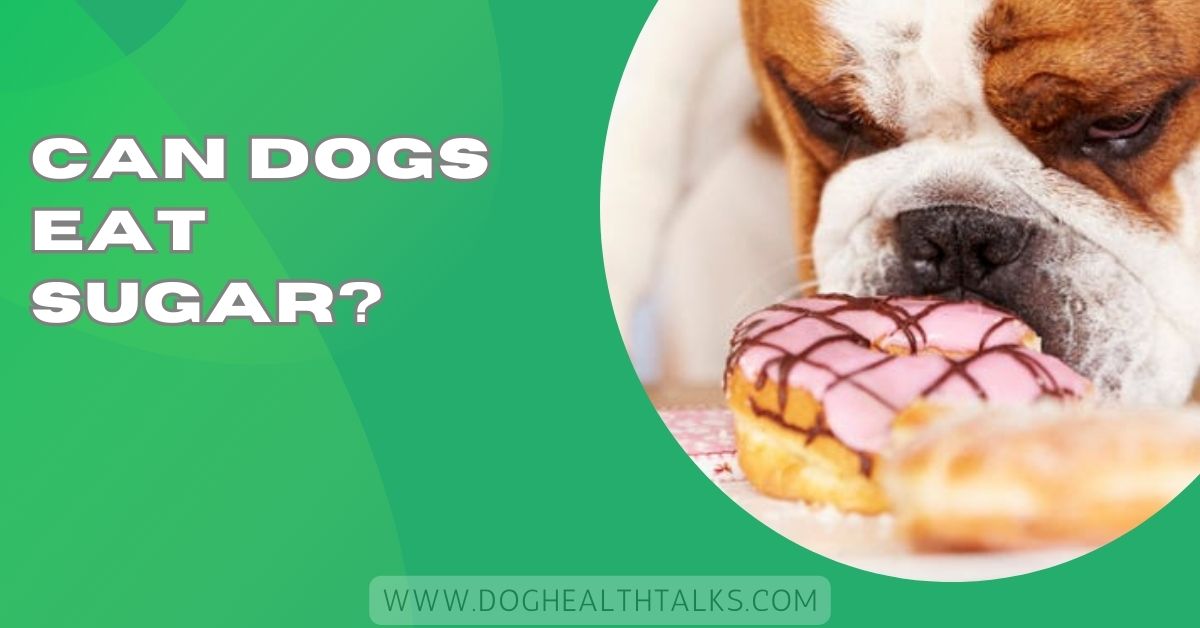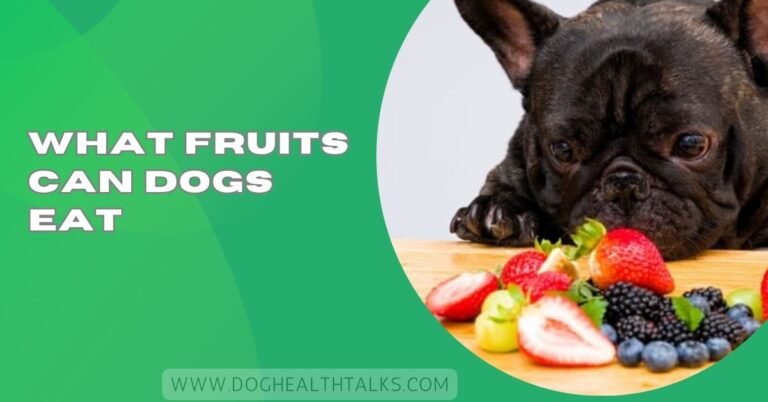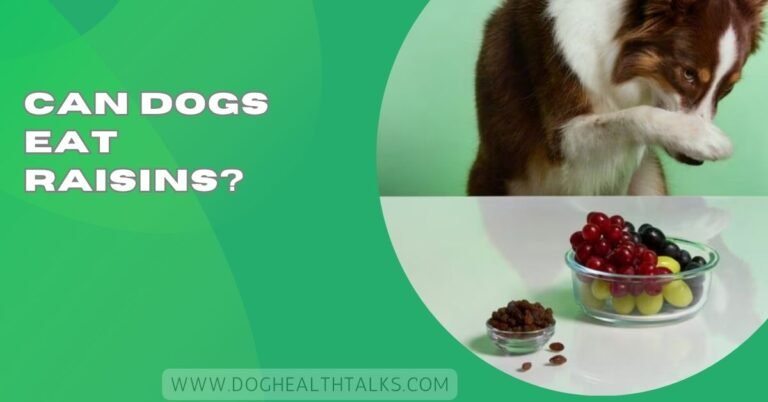Can Dogs Eat Sugar? – The Truth Every Owner Should Know!
Dogs bring us joy every day, and it’s natural to want to share our favorite foods with them. But when it comes to sweet treats, many pet parents pause and ask: Can dogs eat sugar?
Dogs should not eat sugar. While it isn’t directly toxic, sugar is bad for dogs and can lead to obesity, dental issues, and diabetes. Too much may even become poisonous over time.
In this guide, we’ll explore how sugar affects dogs, what types are safe, and what you should do if your pup sneaks some sweet snacks.
What Is Sugar?
Sugar is a type of carbohydrate that gives quick energy. Humans often eat sugar in many forms, such as:
- White sugar
- Brown sugar
- Candy
- Chocolate
- Cakes and cookies
- Sweet drinks
Dogs do not need added sugar in their diet. Their bodies work best with protein, healthy fats, and a small amount of natural carbs from vegetables or grains.
How Much Sugar Can a Dog Have?
Dogs don’t need added sugar in their diet, and too much can cause problems quickly. The only safe sugar is the natural kind found in fruits and some veggies, but even those should be treats—not daily meals.
A good rule is that treats, including fruit, should make up less than 10% of your dog’s total diet. The rest should come from balanced dog food. Keeping sugar limited helps prevent stomach upset, weight gain, and long-term health issues like diabetes.
My Dog Ate Sugar—What Do I Do?
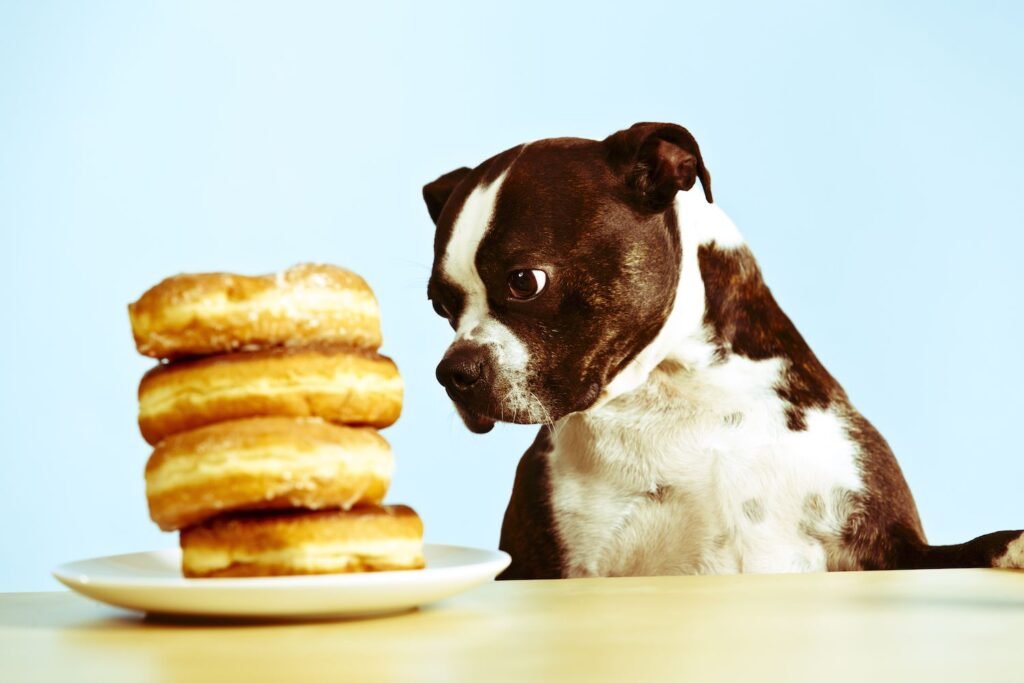
If your dog sneaks a bit of sugar, don’t panic—small amounts usually aren’t dangerous. Watch for signs like vomiting, diarrhea, or restlessness, and make sure they drink water.
The real danger comes if your dog eats a lot of sugar or anything with xylitol, a sweetener that’s very toxic to dogs.
In that case, call your vet right away. If you’re unsure how much your dog ate, it’s always safer to reach out to your veterinarian for advice and peace of mind.
Can Dogs Taste Sugar?
Yes, dogs can taste sweet flavors, though not as strongly as we do. Humans have around 9,000 taste buds, while dogs have about 1,700.
That’s still enough for them to notice and enjoy sweetness, which is why many pups beg when you’re eating desserts or fruits. While they may love the flavor, it’s important to remember that sweet doesn’t equal safe.
Natural sweetness from fruits and vegetables is delicate in moderation, but processed sugar or sugary treats can upset their stomach and harm their long-term health. If your dog craves sweetness, offer safe fruits instead of candy or baked goods.
Must Read: Why Is My Dog Coughing? – Top Reasons Explained 2025 Guide
What Types of Sugar Are Healthy for Dogs?
The only sugars that are safe for dogs come from natural sources like fruits and vegetables. Fruits such as blueberries, apples, and watermelon contain natural sugars, but they also offer vitamins, fiber, and antioxidants that benefit your dog’s health.
Vegetables like carrots and pumpkin provide mild sweetness with fewer sugars, making them even safer choices.
Added sugars—like brown sugar, powdered sugar, or corn syrup—should always be avoided, as they offer no benefits and can cause obesity or diabetes.
Keep in mind that even natural sugars should be given in moderation and used as treats, not as a regular diet.
3 Health Risks of Sugar for Dogs
1. Stomach upset
Too much sugar can upset your dog’s stomach, causing gas, bloating, vomiting, or diarrhea. Even a small amount may leave them uncomfortable and restless.
Dogs’ digestive systems aren’t built to handle processed sugar, so it’s essential to avoid giving them sweets to prevent unnecessary stomach problems.
2. Metabolic issues
Regular sugar intake can lead to obesity, diabetes, and pancreatitis in dogs. Their bodies process sugar less efficiently than ours, making them more sensitive to long-term health risks.
Avoid sugary foods to keep your dog’s weight, blood sugar, and overall metabolism stable, healthy, and functioning correctly.
3. Tooth decay
Sugar feeds harmful bacteria in your dog’s mouth, leading to plaque buildup, cavities, and gum disease.
Over time, dental issues can cause pain, bad breath, and even affect overall health. Protect your dog’s teeth by avoiding sugary foods and sticking with vet-approved chews or safe crunchy treats.
Health Risks of Artificial Sweeteners for Dogs

Artificial sweeteners, especially xylitol, are highly dangerous for dogs. Even tiny amounts can cause vomiting, weakness, seizures, or liver failure.
Other sweeteners, like aspartame and saccharin, aren’t safe either. Always check labels and avoid sharing “sugar-free” foods with your pup. When in doubt, contact your vet immediately.
Read Out: Can Dogs Eat Slim Jims – Vet-Approved Guide for Pet Owners
Before Sharing With Your Pooch
It’s tempting to give in when your dog looks at you with those big, begging eyes. But as a responsible pet parent, your job is to keep them safe.
If you want to share food, stick to dog-safe fruits and veggies. Better yet, choose healthy dog treats designed for their nutritional needs.
Remember: Dogs don’t miss what they don’t know. If you never offer them sugary snacks, they won’t crave them. Instead, reward your pup with love, playtime, and safe, tasty treats that support their health.
Side Effects Of Dog Eating Sugar
Dogs that eat sugar may experience upset stomach, bloating, gas, vomiting, or diarrhea. Long-term, regular sugar consumption can cause obesity, diabetes, tooth decay, and pancreatitis.
Since sugar has no nutritional value for dogs, avoiding it is the safest way to protect your pup’s health and overall well-being.
Is Sugar More Dangerous for Puppies?
Yes, puppies are more sensitive than adult dogs. Their bodies are still growing, and sugar can affect them faster.
Sugar can cause:
- Sudden energy crashes
- Weak immune system
- Poor growth habits
Puppies should never be given sweet foods.
How Many Grams Of Sugar Can Kill A Dog
Sugar itself is unlikely to kill a dog in small amounts, but large quantities can cause dangerous issues like pancreatitis or diabetes complications.
What’s deadly is xylitol, a sugar substitute, which can be fatal in tiny doses. Always call your vet if your dog eats a significant amount.
What To Do If Your Dog Eats Sugar
If your dog eats a little sugar, stay calm and monitor for vomiting, diarrhea, or restlessness. Provide fresh water and keep them comfortable.
If they ate a large amount of food with xylitol, call your vet immediately. Quick action is essential, especially if toxic ingredients may be involved.
Can Dogs Have Brown Sugar?
Brown sugar isn’t toxic, but it isn’t safe for dogs. It can upset their stomach and lead to obesity, diabetes, or dental problems over time.
Since dogs gain no health benefits from it, it’s best to avoid brown sugar altogether and stick to natural, dog-safe fruits for sweetness.
Is Brown Sugar Bad For Dogs?
Brown sugar is not toxic to dogs, but it’s important to be cautious about feeding it to them. While a small amount may not cause immediate harm, brown sugar is still a form of added sugar and can contribute to health issues if consumed regularly.
Excessive sugar intake in dogs can lead to obesity, dental problems, and even diabetes over time.
Can Dogs Have Powdered Sugar?
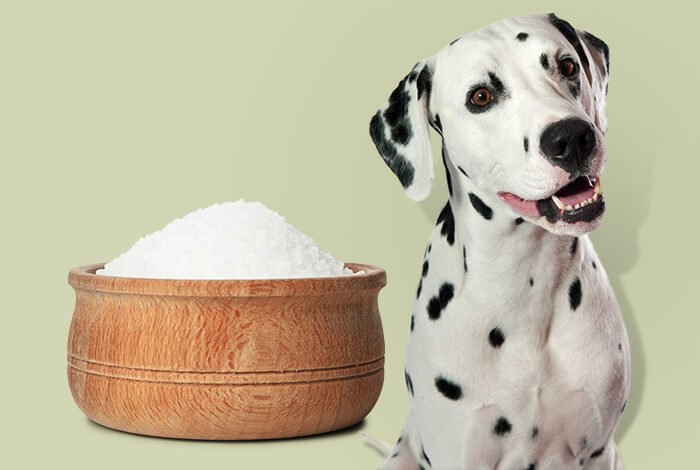
Powdered sugar offers no nutritional value and can upset your dog’s digestive system. Regular intake may cause weight gain, diabetes, and dental disease.
While a tiny accidental lick isn’t usually dangerous, you should avoid giving powdered sugar on purpose and instead focus on safe, vet-approved treats or snacks.
Can Dogs Have Corn Syrup?
Corn syrup isn’t directly toxic, but it’s very high in sugar and can harm your dog’s health if eaten often.
Regular use can cause obesity, high blood sugar, and tooth decay. Since dogs don’t need added sugars, it’s best to avoid corn syrup and choose healthier alternatives.
Can Dogs Eat Candy And Lollipops?
No, candy and lollipops are unsafe for dogs. They’re loaded with sugar and may contain dangerous ingredients like chocolate, xylitol, raisins, or nutmeg.
Even small amounts can cause stomach upset or poisoning. Always keep candy out of reach and offer safe, dog-friendly treats to satisfy your pup instead.
You Should Know: How Do You Know If Your Dog Has Parvo: Key Signs to Notice!
Can Dogs Have Sugar Water?
Sugar water isn’t a safe choice for dogs. Some people suggest it for weak puppies, but veterinarians do not recommend it because it can cause spikes in blood sugar.
If your dog seems weak or ill, it’s essential to contact your vet for proper care and safe treatment.
Is Sugar Bad for Dogs?
Yes, sugar is bad for dogs because it gives no health benefits. Too much sugar can cause weight gain, dental problems, diabetes, stomach upset, and low energy over time. Dogs stay healthier without sugary foods.
Can Dogs Eat Sugar Powder?
Dogs should not eat sugar powder. Even small amounts can upset their stomach and cause vomiting or diarrhea. Regular use may lead to obesity and dental issues. Sugar powder has no nutritional value for dogs.
Can Dogs Eat Sugar Once?
A dog eating sugar once in a very small amount may not show problems. Still, it is not recommended. Even one-time sugar can upset digestion, and making it a habit can harm your dog’s health later.
Can Dogs Eat Jaggery
No, dogs should not eat jaggery. Even though it’s less processed than white sugar, it’s still high in sugar and can cause obesity, dental issues, and diabetes over time.
Dogs don’t gain any health benefits from jaggery, so it’s best to avoid it and offer safe alternatives.
Is Sugar Good For Dogs Vomiting
No, sugar is not good for dogs that are vomiting. Giving sugar can worsen stomach upset and cause further dehydration.
Vomiting often signals illness, infection, or digestive trouble, so the safest step is to withhold food briefly, provide water, and call your veterinarian for proper treatment advice.
Water And Sugar For Dog Vomiting
Avoid giving sugar water to a vomiting dog. It can make nausea worse and doesn’t address the real problem.
Dogs with vomiting need hydration, rest, and possibly veterinary care. If your dog vomits more than once or seems weak, call your vet immediately instead of trying home remedies.
Can Dogs Eat Sugar Cane
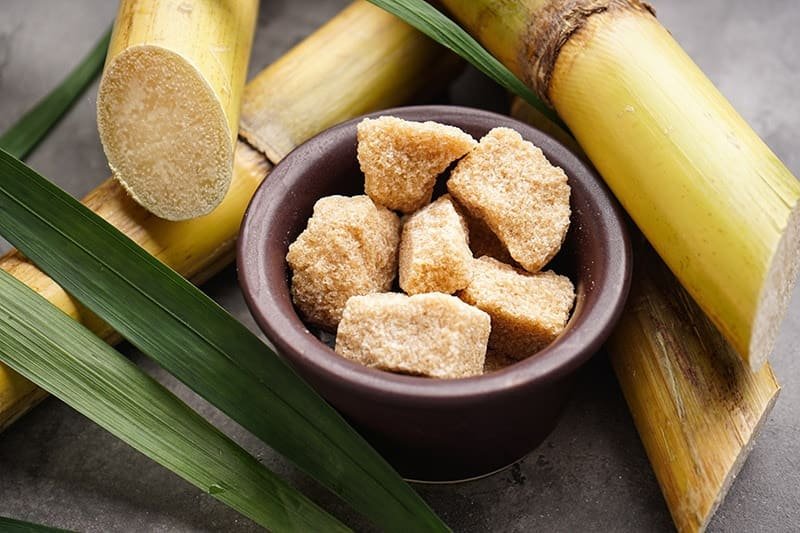
No, dogs should not eat sugar cane. It’s packed with raw sugar that can harm their digestion, cause obesity, or damage teeth.
The fibrous stalk also poses a choking hazard or blockage risk. Skip sugar cane entirely and stick to safe dog-friendly fruits or vegetables as treats.
Can Dogs Eat Honey
Yes, dogs can have small amounts of raw honey. It contains natural sugars, antioxidants, and can even soothe sore throats.
However, too much honey can lead to weight gain or high blood sugar. Puppies, overweight dogs, or diabetic dogs should avoid honey. Always feed it sparingly as a treat.
Can Dogs Eat Sugar Cookies

Dogs should generally avoid sugar cookies and similar treats. While a small amount of sugar is not toxic to dogs, these cookies often contain ingredients that can be harmful. For example, many sugar cookies have chocolate, raisins, or xylitol, all of which are dangerous for dogs.
Additionally, the high sugar content can lead to obesity and dental issues over time.
Conclusion
Can dogs eat sugar is a common question, and while small amounts may not be immediately harmful, regular or excessive sugar can lead to serious health issues in dogs, so it’s best avoided.
Sugar might seem harmless, but it offers no real benefit to dogs and can create more health problems than joy. While a tiny accidental lick usually isn’t dangerous, regular sugar intake can lead to obesity, diabetes, and dental issues.
Instead of sharing sweets, stick to dog-safe fruits, veggies, and vet-approved treats that support your pup’s well-being. Remember, keeping your dog away from sugar isn’t about depriving them—it’s about protecting their health so they can live a longer, happier life by your side.
FAQ’s
How Much Sugar Can Harm A Dog?
Even small amounts of sugar can upset your dog’s stomach. Regular or large intake risks obesity, diabetes, and dental disease, so avoid offering it.
What Is The Most Toxic Thing A Dog Can Eat?
Xylitol is highly toxic to dogs, even in tiny amounts. It can cause seizures, liver failure, or death. Always check labels and avoid it.
Can I Give My Dog A Little Sugar?
A tiny lick won’t usually harm your dog, but sugar has no health benefits. It’s safer to avoid it and offer healthier treats.
What Happens If My Dog Eats Sugar Once?
One small sugary bite may cause mild stomach upset, but it’s rarely dangerous. Problems occur with repeated feeding or large amounts, so avoid sugar.
Is Cheese Bad For Dogs?
Cheese isn’t toxic, but it can upset sensitive stomachs or cause weight gain. Small portions are usually safe, but avoid overfeeding and flavored cheeses.
Is there any benefit of sugar for dogs?
Sugar is not generally beneficial for dogs and can actually pose health risks. While dogs do require carbohydrates as part of their diet for energy, these should primarily come from healthier sources like whole grains and vegetables.
